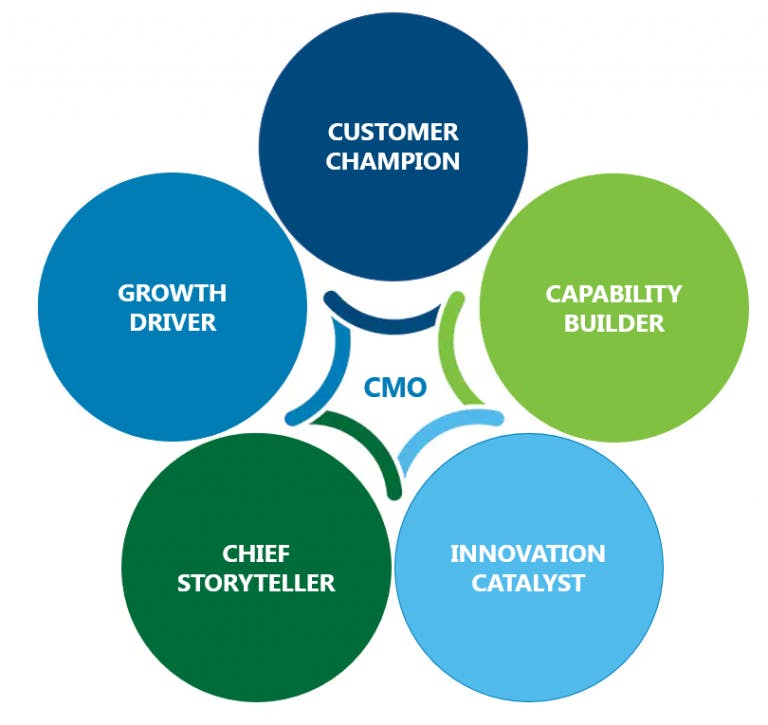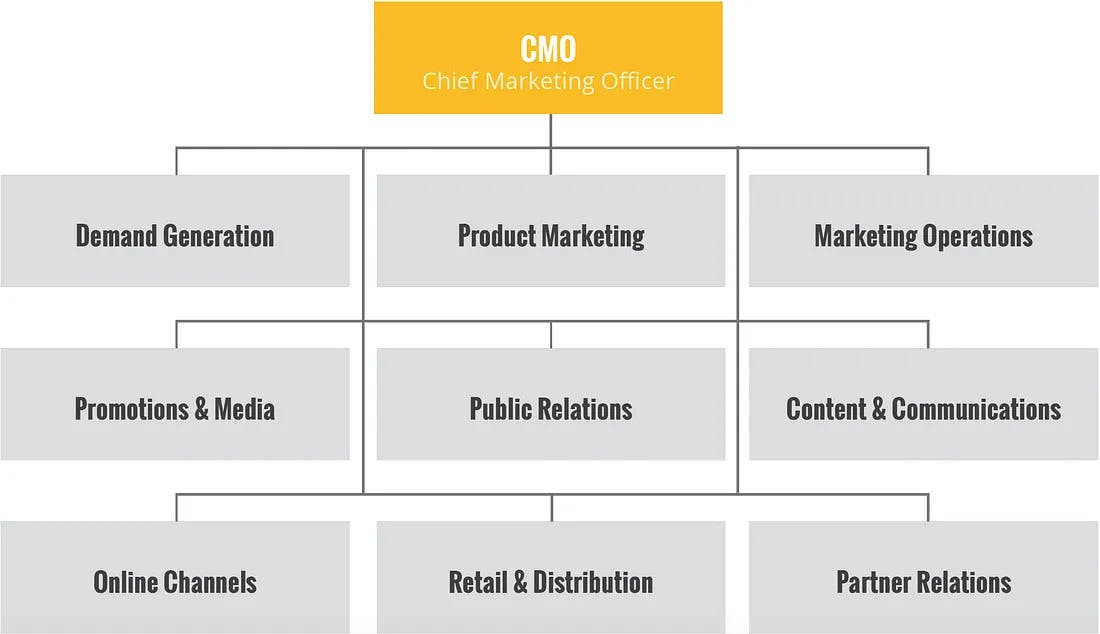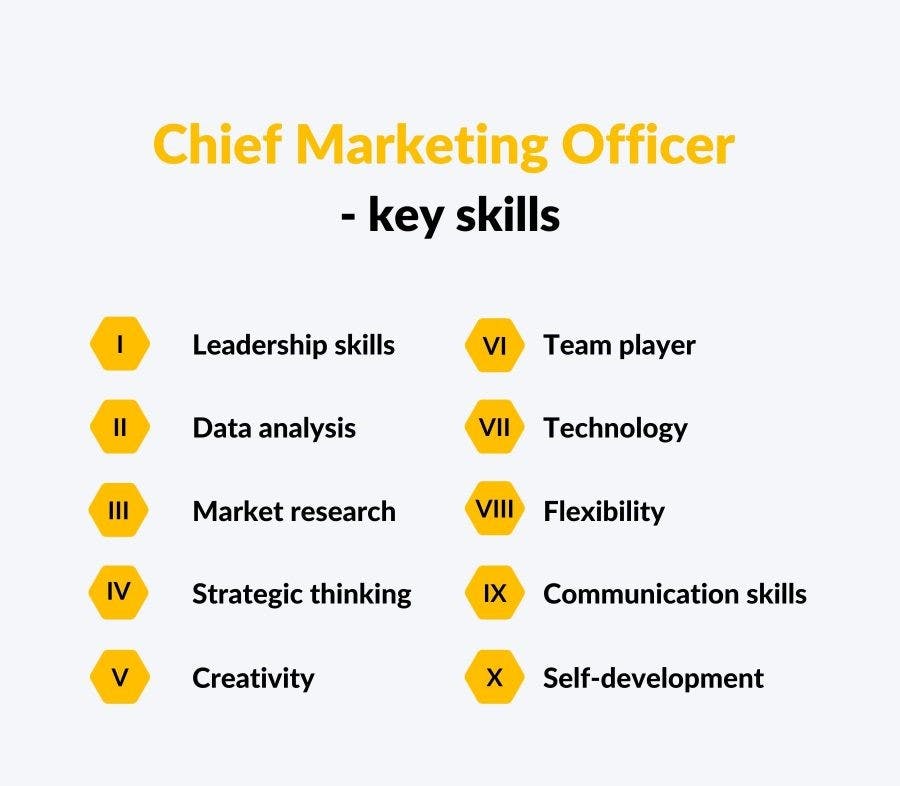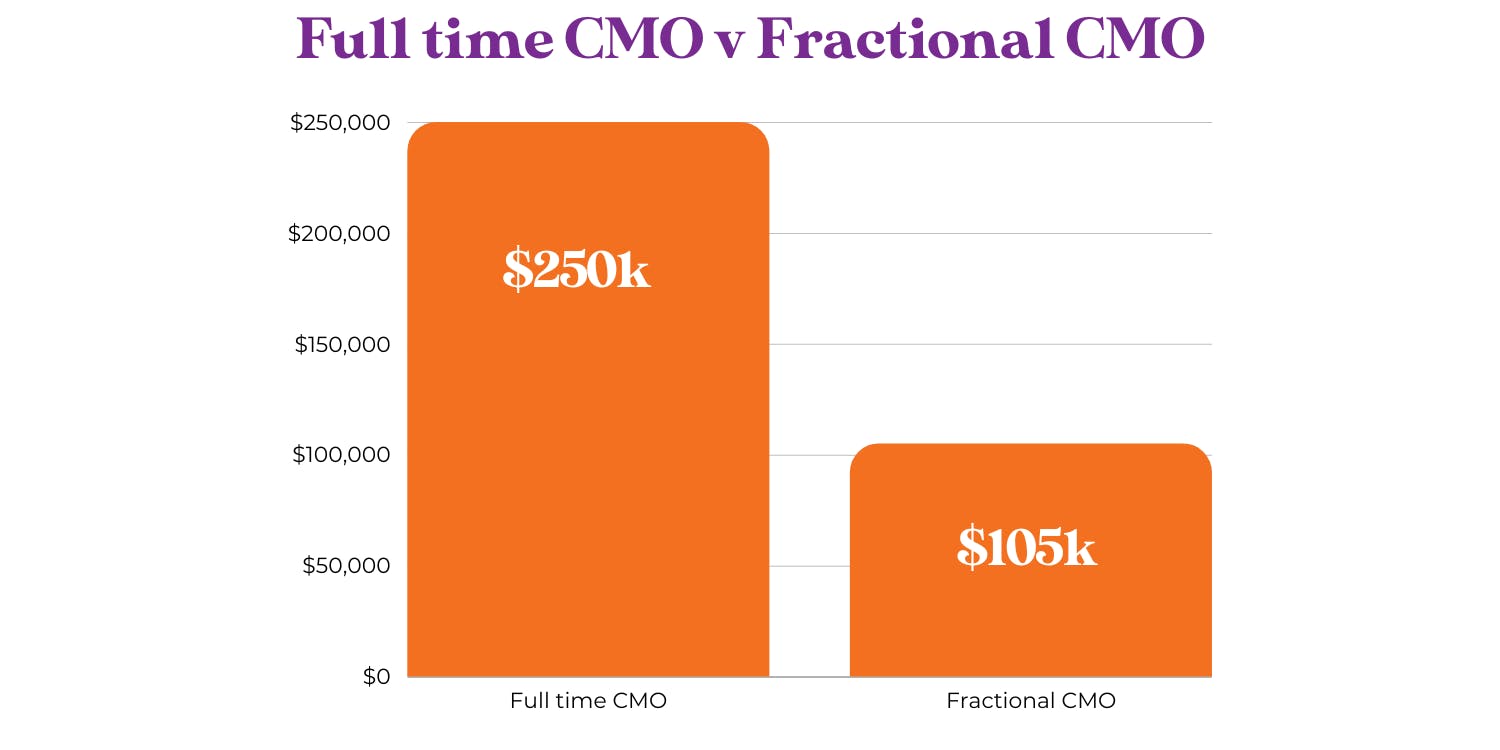Chief Marketing Officer (CMO): a complete guide
Dec 14th, 2023

Contents
What is a chief marketing officer?
What does a chief marketing officer do?
How to hire a chief marketing officer?
Fractional chief marketing officer
Today, the role of chief marketing officer has turned into a multifaceted position. As businesses adapt to ever-changing consumer behavior and emerging technologies, the CMO's role has become more complex and demanding than ever before. CMO should be the guardian of a company's brand and messaging and a strategic leader driving growth and innovation.
To become a chief marketing officer, a person should have extensive experience managing marketing teams and campaigns with substantial budgets. A successful CMO must be able to lead and supervise a team while achieving results that align with marketing objectives. Because of the broad nature of this role, individuals in this position often take on various responsibilities within their companies.
This article will discuss the CMO’s responsibilities and skills and explain how this position compares to other managing roles in the marketing function. Whether you're a marketing professional looking to climb the corporate ladder or a business enthusiast seeking insight into the driving force behind successful brands, this article will help clear up the main aspects of this job and the requirements for C-suite marketers.
What is a chief marketing officer?
A chief marketing officer (CMO) is a high-level executive within an organization responsible for overseeing all aspects of planning and execution of marketing strategy. This specialist plays a crucial role in defining the brand's identity, messaging, and positioning to resonate with target audiences.
CMO’s responsibilities typically include developing a big-picture marketing strategy, establishing objectives, and supervising teams involved in marketing activities like branding and communications. CMOs often collaborate with other departments, such as sales, product development, and customer service, to ensure a cohesive approach to customer engagement and satisfaction. In some organizations, the role of a CMO may expand to include responsibilities like sales management, business development, and customer relationship management, making them pivotal leaders in driving overall business growth and success.

Furthermore, CMOs should understand and study market trends, consumer behavior, and competitive landscapes. They utilize market research and data analysis to make decisions about marketing strategies and product development, ensuring the company remains competitive and responsive to customer needs.
In recent years, CMOs have taken a leading role in driving digital transformation efforts within organizations. They are responsible for adapting marketing strategies to leverage digital channels effectively. It includes online advertising, social media marketing, email marketing, and content marketing. In addition, CMOs need to stay updated with the latest digital marketing tendencies and technologies to remain competitive.
Chief marketing officer vs VP of marketing vs marketing director
Now, we will compare the CMO to the vice president of marketing and marketing director in terms of their position in the company hierarchy, decision-making levels, and budget influence and describe the similarities and differences between these roles. Remember that the specific responsibilities and impact of these positions can vary depending on the organization's size and structure.
A CMO is typically one of the highest-ranking executives in the company, often reporting directly to the CEO or other high-level position. Chief marketing officers are responsible for setting the company’s overall marketing strategy and vision. They make strategic decisions regarding target markets, brand positioning, and marketing campaigns. CMOs have significant influence over the budget, often controlling the allocation of resources across various marketing initiatives.
Vice president of marketing is a senior leadership position but is typically one level below the CMO in the organizational hierarchy. They may report to the CMO or another executive. VPs of Marketing play a crucial role in implementing the strategy set by the CMO and turning it into an actionable plan, including campaign development and management. Moreover, VPs of Marketing usually manage a portion of the marketing budget and have decision-making authority over specific initiatives or departments within the organization.
Marketing directors are typically mid-level managers within the marketing department. They report to higher-level marketing leaders like the CMO or VP of Marketing. These specialists are responsible for executing strategies and managing specific areas or teams within the marketing department. They are often involved in more tactical decision-making, such as choosing specific advertising channels or managing day-to-day marketing activities.
Marketing directors may control smaller portions of the budget, typically allocated to their specific areas or projects. They make sure that budget resources are used efficiently for their assigned responsibilities. Thus, the decision-making level and budget influence decrease as you move down the hierarchy, with CMOs making strategic decisions, VPs focusing on strategic implementation, and marketing directors handling more operational aspects.
What does a chief marketing officer do?
The chief marketing officer is responsible for controlling various aspects of a company's marketing strategy and operations. Let us consider the CMO’s primary duties.
Developing marketing strategy
The CMO is responsible for developing a comprehensive marketing strategy that aligns with the company's overall goals and objectives. This includes defining target markets, positioning the brand, and determining the most effective marketing channels. This task is at the core of their role as it sets the direction and vision for all marketing efforts within the company.
To develop an effective product marketing strategy, the CMO defines the target market or audience the company aims to reach. This involves performing market research to understand customer demographics, needs, and behaviors. Once the target audience is identified, the CMO focuses on positioning the company's brand in a way that resonates with these customers. It includes determining the unique value proposition and messaging to differentiate the company from competitors.
In addition, the CMO is responsible for selecting the most appropriate marketing channels and tactics to reach the target customers, such as digital marketing, traditional advertising, content marketing, social media, public relations, etc. The strategy also encompasses setting specific marketing goals, KPIs, and deadlines for implementation.
Brand management
CMOs are critical in building and maintaining the company's brand image. They ensure the brand's messaging, visual identity, and values are consistent across all marketing channels. The specialist employs various tactics to enhance the recognition of the company's products and increase the perceived value of the brand in comparison to competitors’ offerings.
CMOs need to stay attuned to customer feedback, industry trends, and competitive positioning to make decisions that strengthen the brand's reputation. Crisis management and reputation repair are also essential aspects of their role, as they must swiftly address any issues that may negatively impact the brand's image.

Driving product adoption
For a successful launch and adoption of new products, the CMO should have a solid understanding of product marketing. A professional should be able to create effective go-to-market strategies, develop product positioning and messaging, and drive brand awareness via diverse marketing channels. Moreover, the chief marketing officer designs marketing campaigns highlighting the product's unique features, benefits, and solutions to potential problems or challenges customers face.
Furthermore, CMOs collaborate with product development teams to ascertain that product improvements align with customer demands. They may also oversee user training, onboarding, and customer support initiatives to facilitate a smooth and positive user experience, thereby encouraging adoption.
Analyzing marketing metrics
The CMO collaborates with the team to identify key performance indicators that measure progress toward strategic goals. Moreover, the CMO oversees the development of a data strategy, ensuring that the right tools and systems are in place for accurate data collection and measurement.
The other CMO’s responsibility is to evaluate the overall performance of marketing activities against established KPIs. They prioritize a strategic perspective, focusing on whether marketing initiatives contribute to long-term success. Based on data analysis and insights, the CMO formulates strategic recommendations. These recommendations guide high-level decisions on budget allocation, targeting different customer segments, refining messaging, and exploring new marketing channels.
In addition, the CMO is responsible for assessing the return on investment of marketing campaigns and strategies, considering their impact on the organization's growth and sustainability. The CMO communicates the strategic implications of marketing performance to the executive team and other stakeholders. They use these insights to guide overall business strategy.
Team leadership
CMOs supervise a team of marketing professionals, including managers, directors, and specialists. CMOs set the vision, direction, and plans for the marketing team, ensuring that everyone is working toward a common goal. They provide guidance, mentorship, and support to their team members, fostering a collaborative and innovative work environment.
Successful team leadership also involves talent acquisition and development, where CMOs identify and recruit top marketing talent while nurturing the growth and skills of existing team members. Moreover, the chief marketing officer's responsibilities include defining roles and promoting a culture of creativity.
Budget management
CMOs manage the marketing budget, ensuring it is used efficiently to achieve strategic goals. They must evaluate the expected outcomes of different marketing activities and allocate resources accordingly. This may involve prioritizing high-impact campaigns, optimizing underperforming areas, and reallocating funds in response to changing market dynamics or campaign results.
Effective budget management also involves setting and monitoring key performance indicators to track the financial performance of marketing initiatives. CMOs must regularly assess whether marketing activities generate the expected ROI and adjust the process as needed.
Public relations and thought leadership
Depending on the organization, CMOs may also be responsible for managing the company's image in the media and among stakeholders. It includes maintaining positive relationships with media outlets, effectively addressing public concerns or crises, and proactively sharing company news and achievements. CMOs may also oversee the preparation of press releases, interviews, and media monitoring to ensure the company's message aligns with its brand and strategic objectives.
The chief marketing officer serves as the company's representative at industry gatherings, conferences, and workshops. In this role, they establish professional connections and stay updated on industry advancements. They often contribute to thought leadership initiatives by sharing their expertise through articles, blogs, speaking engagements, and participation in industry forums. By positioning themselves and the company as authorities in their field, CMOs can enhance the company's credibility and reputation.
In conclusion, the CMO is tasked with responsibilities that vary from developing and executing marketing strategies to managing brand identity, leading teams, and making data-driven decisions. CMOs are responsible for driving customer acquisition and retention, optimizing marketing budgets, and controlling the effective use of digital channels. Their role encompasses strategic leadership and involvement in marketing initiatives aimed at achieving growth, enhancing brand reputation, and increasing the company's success in the market.
How to hire a chief marketing officer?
A chief marketing officer is an expert recognized for their strong leadership, persuasive communication, and exceptional organizational abilities. Let's consider the skills and experience required for a candidate for the CMO position.
Bachelor’s degree in marketing or a related subject. Chief marketing officers typically hold a bachelor's degree in marketing, advertising, PR, or a related field. Moreover, certifications in marketing and business or a postgraduate degree can enhance the visibility and impact of the resume for this position. Furthermore, an individual may possess practical knowledge in economics, accounting, and data analysis.
Ten years of experience in marketing or business development. Ideally, this also includes three to five years in a managerial role. In addition, the chief marketing officer should have expertise in developing strategies and business plans for different marketing aspects, such as branding and product promotion.
Strong leadership skills. Confidence, public speaking, and interpersonal skills are essential for the CMO, as this specialist is responsible for managing an entire department. The chief marketing officer should motivate employees and be a reliable source of knowledge to ensure the team’s success.
Excellent communication and problem-solving skills. Chief marketing officer should communicate effectively with colleagues. They should be able to resolve conflicts, articulate the company’s vision and objectives to other team members, and receive feedback.

Data management skills. The modern CMO must prioritize data-driven approaches, possess digital expertise, and be focused on revenue growth. CMOs need to be proficient in interpreting data to derive meaningful insights. This includes understanding key performance indicators, customer behavior data, market trends, and campaign analytics.
Strategizing. Developing and implementing a marketing strategy is crucial for a successful chief marketing officer. They should be able to identify opportunities, analyze the total addressable market, and, as a result, create effective go-to-market strategies. Furthermore, CMOs must know how to translate data into actionable insights.
Technology proficiency. CMOs should be familiar with marketing technology stacks, including data analytics tools, CRM systems, and marketing automation platforms. Moreover, proficiency in social media management tools is essential for analyzing social media marketing efforts. In addition, they should understand how to create and optimize ad campaigns, set budgets, and track ad performance with online advertising platforms.
Therefore, CMOs must demonstrate strong leadership qualities, effective communication, problem-solving abilities, and data management skills for data-driven decision-making. Proficiency in marketing, social media management, and emerging technologies is crucial to their success in the digital marketing landscape.
Chief marketing officer salary
CMO’s total compensation in the United States ranges from $263,000 to $483,000 per year, according to Glassdoor. The projected annual compensation is $350,610, with an average yearly salary of $203,589. It depends on education, certifications, skills, and the number of years of experience. The additional pay amounts to $147,021 annually. Supplementary compensations may include cash bonuses, commissions, tips, and profit-sharing.
According to Payscale, CMOs in the early stages of their career, with less than four years of experience, receive an average salary of $97,479. A mid-career CMO with over five years of experience earns a compensation of $132,214, while a specialist with over ten years of experience earns about $179,732. The average base salary for this position is $182,326 per year.
The median annual pay for a CMO in Germany is €85,436, with an estimated total annual compensation of €105,636. The estimated additional compensation, which includes bonuses, commission tips, and profit-sharing, is €20,200 per year.
Payscale reports that a mid-career CMO in Europe with more than five years of experience receives an average compensation of €101,736, including tips, bonuses, and overtime pay. For experienced CMOs with over ten years of experience, the total average wage is €115,033. In the later stages of their career, CMOs earn an average total compensation of €125,050.
It's vital to note that compensation levels can vary significantly across Europe. Northern European countries generally offer higher compensation, while Southern and Eastern European countries typically have lower numbers. You need to conduct region-specific research when seeking information on salary in a particular area.
Fractional chief marketing officer
When companies expand to a point where they require the services provided by a CMO but have not reached a stage where they can hire a senior and experienced professional, they can seek professional help from a fractional CMO.
A fractional CMO is a part-time executive responsible for managing an in-house marketing team. This role encompasses the usual responsibilities of a chief marketing officer but is designed for businesses that do not require a full-time CMO. By employing a fractional CMO, a company can get the expertise and guidance from a specialist while maintaining a lean structure and reducing unnecessary expenses.

Both CMOs and fractional CMOs are responsible for providing leadership in marketing. They oversee marketing strategies and campaigns to achieve business objectives. These roles involve developing and implementing plans to market products or services, enhance brand recognition, and drive revenue growth. CMOs and fractional CMOs manage marketing teams, ensuring that all members work effectively toward marketing goals.
However, there are some differences between these positions. A CMO typically holds broader responsibilities, including strategic planning, budget management, and executive-level decision-making. Fractional CMOs may focus on specific projects, campaigns, or areas within the marketing department. CMOs are long-term company employees, whereas fractional CMOs provide services for a limited duration, often on a project basis. Hiring a full-time CMO is a significant financial commitment, while fractional CMOs are often a cost-effective option for small business marketing.
Today, the CMO plays a pivotal role in guiding their organization through an unpredictable environment, ensuring a robust and adaptable brand image. Organizations increasingly prioritize the consumer in their strategic approaches, focusing on enhancing the customer experience. Thus, CMOs will play a critical role in bridging the gap between consumer data and implementing strategic initiatives while humanizing and personifying the brand.
